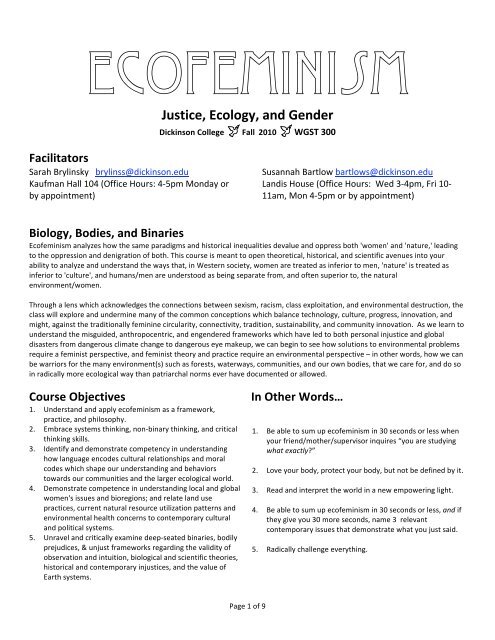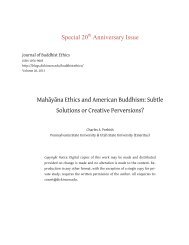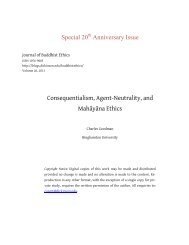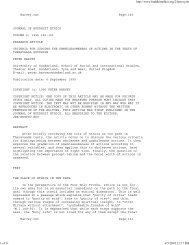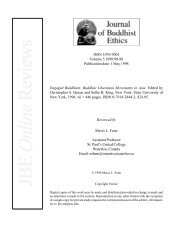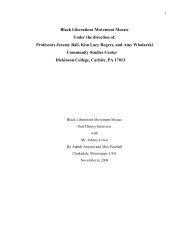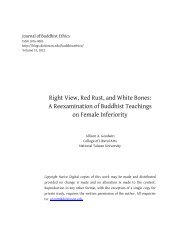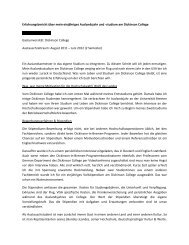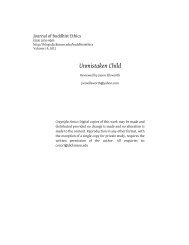Sarah Brylinsky & Susannah Bartlow, Dickinson College
Sarah Brylinsky & Susannah Bartlow, Dickinson College
Sarah Brylinsky & Susannah Bartlow, Dickinson College
Create successful ePaper yourself
Turn your PDF publications into a flip-book with our unique Google optimized e-Paper software.
<br />
Ecofeminism<br />
Justice, Ecology, and Gender <br />
<strong>Dickinson</strong> <strong>College</strong> Fall 2010 WGST 300 <br />
<br />
Facilitators <br />
<strong>Sarah</strong> <strong>Brylinsky</strong> brylinss@dickinson.edu <br />
Kaufman Hall 104 (Office Hours: 4‐5pm Monday or <br />
by appointment) <br />
<br />
Page 1 of 9 <br />
<strong>Susannah</strong> <strong>Bartlow</strong> bartlows@dickinson.edu <br />
Landis House (Office Hours: Wed 3‐4pm, Fri 10‐<br />
11am, Mon 4‐5pm or by appointment)<br />
<br />
Biology, Bodies, and Binaries <br />
Ecofeminism analyzes how the same paradigms and historical inequalities devalue and oppress both 'women' and 'nature,' leading <br />
to the oppression and denigration of both. This course is meant to open theoretical, historical, and scientific avenues into your <br />
ability to analyze and understand the ways that, in Western society, women are treated as inferior to men, 'nature' is treated as <br />
inferior to 'culture', and humans/men are understood as being separate from, and often superior to, the natural <br />
environment/women. <br />
<br />
Through a lens which acknowledges the connections between sexism, racism, class exploitation, and environmental destruction, the <br />
class will explore and undermine many of the common conceptions which balance technology, culture, progress, innovation, and <br />
might, against the traditionally feminine circularity, connectivity, tradition, sustainability, and community innovation. As we learn to <br />
understand the misguided, anthropocentric, and engendered frameworks which have led to both personal injustice and global <br />
disasters from dangerous climate change to dangerous eye makeup, we can begin to see how solutions to environmental problems <br />
require a feminist perspective, and feminist theory and practice require an environmental perspective – in other words, how we can <br />
be warriors for the many environment(s) such as forests, waterways, communities, and our own bodies, that we care for, and do so <br />
in radically more ecological way than patriarchal norms ever have documented or allowed. <br />
<br />
Course Objectives In Other Words… <br />
1. Understand and apply ecofeminism as a framework, <br />
practice, and philosophy. <br />
2. Embrace systems thinking, non‐binary thinking, and critical <br />
thinking skills. <br />
3. Identify and demonstrate competency in understanding <br />
how language encodes cultural relationships and moral <br />
codes which shape our understanding and behaviors <br />
towards our communities and the larger ecological world. <br />
4. Demonstrate competence in understanding local and global <br />
women's issues and bioregions; and relate land use <br />
practices, current natural resource utilization patterns and <br />
environmental health concerns to contemporary cultural <br />
and political systems. <br />
5. Unravel and critically examine deep‐seated binaries, bodily <br />
prejudices, & unjust frameworks regarding the validity of <br />
observation and intuition, biological and scientific theories, <br />
historical and contemporary injustices, and the value of <br />
Earth systems. <br />
<br />
1. Be able to sum up ecofeminism in 30 seconds or less when <br />
your friend/mother/supervisor inquires “you are studying <br />
what exactly?” <br />
<br />
2. Love your body, protect your body, but not be defined by it. <br />
<br />
3. Read and interpret the world in a new empowering light. <br />
<br />
4. Be able to sum up ecofeminism in 30 seconds or less, and if <br />
they give you 30 more seconds, name 3 relevant <br />
contemporary issues that demonstrate what you just said. <br />
<br />
5. Radically challenge everything. <br />
<br />
Course Responsibilities <br />
Engagement is both our classroom policy and a key component of the course goals. Your responsibilities include participating <br />
actively in class discussions, completing assigned work by their due dates, helping to create a climate of learning and collaboration, <br />
showing respect for your peers, performing your fair share of work on group projects, and adhering to a high standard of academic <br />
honesty. <br />
<br />
Students will be held accountable to the academic code of conduct as described in <strong>Dickinson</strong>’s 2008‐2009 Community Standards. <br />
Suspected violation of these standards will be resolved through the formal disciplinary procedures of the college. The following are <br />
excerpted from the 2008‐2009 Community Standards (http://www.dickinson.edu/student/files/commstand0809.pdf): <br />
<br />
“Students can avoid plagiarism by following some very simple advice. Always provide clear and <br />
accurate citations for the sources that inform your work. This is an admonition that goes to the <br />
<br />
<br />
<br />
Plagiarism <br />
To plagiarize is to use <br />
without proper citation <br />
or acknowledgment the <br />
words, ideas, or work of <br />
another. Plagiarism is a <br />
form of cheating that <br />
refers to several types <br />
of unacknowledged <br />
borrowing.” <br />
<br />
<br />
<br />
<br />
<br />
heart of your academic responsibility. Remember that almost all quotations and statistics require <br />
citations. Specific facts and ideas borrowed from others, even if expressed in your own words, <br />
also require citations. Summaries of an author’s argument require citations. It is true that <br />
matters of general knowledge do not usually require citations, but when in doubt, students <br />
should provide footnotes for them. It is also true that students who rely on parents, friends or <br />
others for specific contributions to their work should acknowledge this indebtedness in a <br />
citation. And finally, please understand that paraphrasing means to summarize in your own <br />
words. The surest way to avoid plagiarism when summarizing is to write with sources and notes <br />
closed. If you cannot explain what an author argued from memory, then you probably do not <br />
understand it well enough to paraphrase.”<br />
Students with Disabilities <br />
In compliance with the <strong>Dickinson</strong> <strong>College</strong> policy, we are <br />
available to discuss requests made by students with <br />
disabilities for academic accommodations. Such requests <br />
must be verified in advance by the Coordinator of Disability <br />
Services who will provide a signed copy of an accommodation <br />
letter. Requests for academic accommodations should be <br />
made during the first three weeks of the semester (except for <br />
unusual circumstances) so that timely and appropriate <br />
arrangements can be made. Students are required to register <br />
with Disability Services (first floor of Biddle House (ext. 1080 <br />
or jonesmar@dickinson.edu). <br />
In compliance with the <strong>Dickinson</strong> <strong>College</strong> policy and equal access laws, <br />
we are available to discuss requests made by students with disabilities <br />
for academic accommodations. Such requests must be verified in <br />
advance this semester by Marni Jones, Coordinator of Disability <br />
Services, who will provide a signed copy of an accommodation letter. <br />
This must be presented in a scheduled meeting with me prior to any <br />
accommodations being offered. Requests for academic <br />
accommodations should be made during the first three weeks of the <br />
semester (except for unusual circumstances) so that timely and <br />
appropriate arrangements can be made. Students requesting <br />
accommodations are required to register with Disability Services, <br />
located in Academic Advising, first floor of Biddle House (contact ext. <br />
1080 or jonesmar@dickinson.edu) to verify their eligibility for <br />
reasonable and appropriate accommodations.<br />
<br />
<br />
<br />
<br />
<br />
<br />
<br />
Page 2 of 9 <br />
Religious Conflicts <br />
If the observance of a religious <br />
holiday will conflict with a class <br />
meeting, please let us know in <br />
advance. No student will be <br />
penalized for such absences, but we <br />
must be informed of these <br />
anticipated absences within the first <br />
2 weeks of the semester. <br />
<br />
Attendance Policy: You <br />
may miss one week of class <br />
(that’s two classes) with no <br />
penalty; any additional <br />
missed classes will reduce <br />
the engagement portion of <br />
your grade by one letter <br />
grade per missed class If <br />
you miss more than six <br />
classes, you will <br />
automatically fail the <br />
course. <br />
<br />
<br />
<br />
<br />
<br />
<br />
<br />
<br />
Attendance <br />
Discussion/ <br />
Participation <br />
(Completion of <br />
Course Readings) <br />
Blog Assignments <br />
<br />
Grading <br />
Gendered, <br />
Dualistic Bodies <br />
Paper <br />
<br />
<br />
Ecofeminism Blog<br />
You will be required to blog throughout the course using a <strong>Dickinson</strong> Blog on Wordpress. <br />
http://blogs.dickinson.edu/ecofeminism <br />
You must create a unique account to login and use the course blog. You will be invited to join the blog during the first week of <br />
school – you must respond to this email and create your account by the end of the first week of classes. <br />
<br />
Blogging is an excellent form of social, viral, and experiential‐based knowledge sharing. Blogging is NOT journalism, academic <br />
writing, “copy and paste sharing,” your personal journal, or news. Blogging is a hybrid of many forms of written communication <br />
meant to bridge information sharing and social connectivity – it is a unique outlet with its own expectations, rules, and procedures. <br />
Expectations and an overview of blogging will be provided in class. <br />
<br />
<br />
Submitting Assignments & Receiving Feedback <br />
In an effort to conserve resources, blog posts will only be submitted online by posting on the blogs.dickinson.edu/ecofeminism site, <br />
papers must be submitted via Moodle, and your final podcast will be submitted on both Moodle AND the blog via an embedded <br />
video or sound byte (a process we will go over in class). The only hard copy assignment you will submit is the Midterm Mapping <br />
Project. <br />
<br />
Page 3 of 9 <br />
Ecofeminist <br />
Mapping Project <br />
(Midterm) <br />
Cosmetics Paper <br />
Contemporary <br />
Issues Paper <br />
(Final Paper) <br />
Ecofeminism <br />
Podcast (Final) <br />
Points 100 150 100 100 150 100 150 150 <br />
Weight 10% 15% 10% 10% 15% 10% 15% 15% <br />
A 95‐100 95‐100 95‐100 95‐100 95‐100 95‐100 95‐100 95‐100 <br />
A‐ 90‐94 90‐94 90‐94 90‐94 90‐94 90‐94 90‐94 90‐94 <br />
B+ 87‐89 87‐89 87‐89 87‐89 87‐89 87‐89 87‐89 87‐89 <br />
B 84‐86 84‐86 84‐86 84‐86 84‐86 84‐86 84‐86 84‐86 <br />
B‐ 80‐83 80‐83 80‐83 80‐83 80‐83 80‐83 80‐83 80‐83 <br />
C+ 77‐79 77‐79 77‐79 77‐79 77‐79 77‐79 77‐79 77‐79 <br />
C 74‐76 74‐76 74‐76 74‐76 74‐76 74‐76 74‐76 74‐76 <br />
C‐ 70‐73 70‐73 70‐73 70‐73 70‐73 70‐73 70‐73 70‐73 <br />
D 60‐69 60‐69 60‐69 60‐69 60‐69 60‐69 60‐69 60‐69 <br />
F
<br />
<br />
Assignments & Activities <br />
Blogging <br />
Ecofeminism Unpacked (Blog) – Due Tuesday September 7 th <br />
What prejudices/presumptions have guided your perceptions of your body, nature, and gender? <br />
<br />
Bioregional Quiz (Blog) – Due Tuesday September 28 th <br />
Handout will be provided the second week of class. In teams you will be assigned half of the questions from “The <br />
Bioregional Quiz,” to be turned in via a blog post. Answers should be in narrative form with sources cited. Single sentence <br />
or word answers are not acceptable. <br />
<br />
This Land is MY Land? (Blog) – Due Tuesday October 12 th <br />
How have your thoughts about land and your connection to place changed since the beginning of the course? What things <br />
do you value about the land? <br />
<br />
Writing of Choice (2) – 1 by Midterm, 1 by End of Semester <br />
You will complete two additional blog posts in addition to those required for specific assignments at any point throughout <br />
the course of the semester. These posts follow the same guidelines. You must notify <strong>Sarah</strong> and <strong>Susannah</strong> within one class <br />
period when you have posted your assignment so grading can be returned in a timely manner. <br />
<br />
Papers <br />
Gendered, Dualistic Bodies (3‐5 Page Paper) – Due Tuesday September 21 st <br />
Reflect on your relationship to your body. How is your body both gendered and not gendered? How do you relate to your <br />
body? Is your body gendered? What are the other dualisms which dictate your fundamental associations to your body? Is <br />
your body separate from the environments/systems/people around it? Why and why not? <br />
<br />
Cosmetics Toxicity Report – Due Tuesday November 30 th <br />
<br />
Final‐ Contemporary Issues Paper – Due Friday December 10 th <br />
Possible topic areas: <br />
● Toxicology in the body / nail salons/ The beauty industry <br />
● Ecofeminism and environmental justice/agrojustice issues <br />
● Land use/articulating alternative paradigm(s) for earth/land relationship/partnership ethic <br />
● Bodies: theoretically, historically <br />
● Reproduction / midwifery <br />
● Women and Meat <br />
<br />
Projects <br />
Evening Class: Learning Place at the <strong>College</strong> Farm – Week of September 28 th TBA <br />
You will be required to attend an additional evening class at the <strong>College</strong> Farm, based on the collective schedule of the <br />
course. This evening class will have 1‐2 short readings about the bioregional, agricultural importance of the Cumberland <br />
Valley. <br />
<br />
Mapping Midterm – Due Friday October 15 th <br />
<br />
Ecofeminism Podcast – Due During Final Exam Time (TBA) <br />
Create a short podcast (or video!) explaining ecofeminism in 30 seconds or less, and giving a 1 minute overview of a <br />
particular topic you found interesting over the course of the semester. These projects will be shared via the and with <br />
classmates during the final meeting time. <br />
Page 4 of 9
<br />
<br />
Ecofeminism Course Schedule <br />
THEORY AND GROUNDWORK <br />
<br />
Week One: Introduction to Ecofeminism <br />
<br />
Tuesday August 31 st <br />
• Mies & Shiva, Ecofeminism <br />
In class reflection: What prejudices/presumptions have guided perceptions of your body? Of gender? Nature? <br />
<br />
Friday September 3 rd <br />
• Gaard, Greta. 1998. Pp. 11‐52 in Ecological Politics: Ecofeminists and the Greens, Philadelphia: Temple University <br />
Press. (Study the Ecofeminist Map) <br />
• Epstein, Barbara. 1993. Ecofeminism and Grass‐roots Environmentalism in the United States, pp. 144‐152 in <br />
Hofrichter, Richard (ed.). Toxic struggles: the theory and practice of environmental justice. Philadelphia: New Society <br />
Publishers. <br />
• Alvin Y. Wang, “Gender and Nature: A Psychological Analysis of Ecofeminist Theory” (Journal of Applied Social<br />
Psychology, 1999, vol. 29, issue 11, pp 2410‐2424). <br />
• Rosemary Radford Ruether, “Ecofeminism: Symbolic & Social Connections...” (from Ecofeminism and the Sacred <br />
edited by Carol J. Adams; New York: Continuum, 1993) <br />
<br />
<br />
Week Two: Grounding Ecofeminism: Biology, Nature, and the Body <br />
<br />
Tuesday September 7th <br />
WRITING DUE: ECOFEMINISM UNPACKED BLOG (online by class time) <br />
• Plumwood, Val. 1993. Feminism and Ecofeminism. Pp 19‐40. From Feminism and the Mastery of Nature. New York: <br />
Routledge. <br />
• Fausto‐Sterling, Anne. “Dueling Dualisms” from Sexing the Body (New York: Basic Books, 2000) <br />
• Serano, Julia. “Boygasms and Girlgasms” from Whipping Girl (Seal Press, 2007). <br />
<br />
Friday September 10th <br />
• Elizabeth Grosz, “Refiguring Bodies” (from Volatile Bodies: Toward a Corporeal Feminism, Indiana University Press, <br />
1994). <br />
• Gruen, L. (1993). Dismantling oppression: An analysis of the connection between women and animals. In G. Gaard <br />
(Ed.), Ecofeminisrn: Women, animals, nature (pp. 60‐90). Philadelphia, PA: Temple University Press. <br />
• Somerville, Siobhan. “Introduction” and “Scientific Racism” from Queering the Color Line (Duke University Press, <br />
2000). <br />
<br />
<br />
Week Three: Our Home: Women Speak for/with the Land <br />
<br />
Tuesday September 14 <br />
• Plant, Judith, 1990, Revaluing Home: Feminism and Bioregionalism, Pp. 21‐23 in Andruss, V., Plant, C., Plant, J. & <br />
Wright, E. Home! A bioregional reader. Philadelphia: New Society Publishers. <br />
• Forsey, Helen, 1990, Community: Meeting Our Deepest Needs, pp. 83‐85 in Andruss, V., Plant, C., Plant, J. & Wright, <br />
E., Home! A bioregional reader. Philadelphia: New Society Publishers. <br />
Page 5 of 9
<br />
• Conon, William. The Trouble With Wilderness. <br />
http://www.williamcronon.net/writing/Trouble_with_Wilderness_Main.html <br />
Living is Breathing is Being Exercise <br />
<br />
Friday, September 17 <br />
• Andrea Smith, “Rape of the Land” (from Conquest) <br />
• Sturgeon, N. (1997). The nature of race: Discourses of racial difference in ecofeminism. In K. J. Warren (Ed.), <br />
Ecofeminism: Women. culture. nature (pp. 260‐278). Bloomington, M: Indiana University Press. <br />
• Hill Collins, Patricia. “The Sexual Politics of Black Womanhood.” Black Feminist Thought, Routledge 1991. <br />
• Dolores Williams, “Sin, Nature and Black Women’s Bodies” (from Ecofeminism and the Sacred edited by Carol J. <br />
Adams; New York: Continuum, 1993) <br />
• Jenny Reardon, “Discourses of Participation.” <br />
<br />
<br />
Week Four: Connecting ‘isms’ and Power <br />
<br />
Tuesday, September 21 – Class meets from 12:30‐2:45pm (Guest lecture from Prof. Megan Glick) <br />
• Adler, Margot. 1989.The juice and the mystery. Pp. 151‐154 in Judith Plant (ed), Healing the Wounds: the Promise of<br />
Ecofeminism. Philadelphia: New Society Publishers. <br />
• Plumwood, Val. 1993. Dualism: The Logic of Colonialism. Pp 41‐68. From Feminism and the Mastery of Nature. New <br />
York: Routledge. <br />
<br />
Friday, September 24 <br />
WRITING DUE: Gendered, Dualistic Bodies Paper <br />
• Lorde, Audre. “Uses of the Erotic.” (from Sister Outsider, The Crossing Press, 1983). <br />
• bell hooks, Chapters 1‐7 (from Belonging: A Culture of Place; New York, Routledge, 2009) <br />
<br />
<br />
Week Five: Our Home: Women Speak for/with the Land <br />
<br />
Tuesday, September 28 <br />
WRITING DUE: BIOREGIONAL QUIZ BLOG <br />
• Plant, Judith, 1990, Searching for Common Ground: Ecofeminism and Bioregionalism, pp. 79‐82 in Andruss, V., Plant, <br />
C., Plant, J. & Wright, E., Home! A bioregional reader. Philadelphia: New Society. <br />
• Williams, Terry Tempest. Refuge: An Unnatural History of Family and Place. New York: Vintage, 1991. <br />
• Leonard, Charles, Jim Dodge, Lynn Milliman, and Victoria Stockley, 1990, Where you at? A Bioregional Quiz, Pp.. 29‐<br />
30 in Andruss, V., Plant, C., Plant, J. & Wright, E. Home! A bioregional reader. Philadelphia: New Society Publishers. <br />
• Hayden, Delores. “Is it Possible to Design a Nonsexist City?” Gender and Planning. <br />
<br />
Friday, October 1 <br />
• Barbara Kingsolver, from Animal, Vegetable, Miracle <br />
• LaDuke, Winona. 1993. A Society Based on Conquest Cannot be Sustained: Native Peoples and the Environmental <br />
Crisis, pp. in. 98‐106 Hofrichter, Richard (ed.), Toxic struggles: the theory and practice of environmental justice. <br />
Philadelphia: New Society Publishers. <br />
• Bradley, Candice. 1997. Chapter 17: Keeping the Soil in Good Heart: Women Weeders, the Environment, and <br />
Ecofeminism. Karen J. Warren (ed.) Ecofeminism: Women, Culture and Nature. Indiana University Press. <br />
Bloomington. <br />
<br />
EVENING THIS WEEK: (Meet @ the <strong>College</strong> Farm) <br />
<br />
Page 6 of 9
<br />
Week Six: The Creation Narrative / Our Home: Women Speak for/with the Land <br />
<br />
Tuesday, October 5 <br />
• Carolyn Merchant, “Reinventing Eden.” Chapter 1. <br />
• The Hebrew Christian Creation Story <br />
• Iroquois creation story. <br />
• Andrea Smith, “For All Those Who Were Indian in a Former Life” (from Ecofeminism and the Sacred edited by Carol J. <br />
Adams; New York: Continuum, 1993) <br />
• Eisler, Riane. 1987. Chapter 8. The Other Half of History: Part I. Pp. 104‐119 and Chapter 9. The Other Half of History. <br />
Part II. Pp.120‐134. The Chalice and the Blade. San Francisco: Harper & Row. <br />
<br />
Friday, October 8: Class at Waggoner’s Gap <br />
• Crouch, Martha L. 2001. From Golden Rice to Terminator Technology: Why Agricultural Biotechnology Will Not Feed <br />
the World or Save the Environment. Pp. 22‐ 39 in Brian Tokar (ed) Redesigning Life? The Worldwide Challenge to<br />
Genetic Engineering. New York: Zed Books. <br />
• Thomas Hariot. A Brief and True Report of the New Found Land of Virginia. <br />
http://docsouth.unc.edu/nc/hariot/hariot.html <br />
• Vandana Shiva: Soil Not Oil excerpt <br />
<br />
<br />
Week Seven: Ecofeminist Mapping <br />
<br />
Tuesday, October 12 ‐ Work on Ecofeminist Mapping Project in class <br />
WRITING DUE: THIS LAND IS MY LAND BLOG <br />
<br />
Friday, October 15 <br />
MIDTERM DUE: ECOFEMINIST MAPPING PROJECT <br />
Page 7 of 9 <br />
Tuesday, October 19 <br />
NO CLASS—FALL PAUSE <br />
Come prepared to share with the class <br />
<br />
<br />
CONTEMPORARY ISSUES <br />
<br />
Week Eight: Menstruation – Toxic Tampons and Coming of Age <br />
<br />
Friday, October 23 <br />
• Menstruation Coming of Age – The White Buffalo Calf Woman Story <br />
• Disney Presents “The Story of Menstruation.” http://www.youtube.com/watch?v=4kWR‐rIKRe4 <br />
<br />
<br />
Week Nine: Reproductive Justice <br />
<br />
Tuesday, October 26 <br />
• Nelson, Jennifer. “’Abortions Under Community Control’” from Women of Color and the Reproductive Justice<br />
Movement (New York University Press, 2003) <br />
• Loretta Ross, “The Color of Choice” (from The Color of Violence: the INCITE! anthology edited by INCITE: Women of <br />
Color Against Violence; Cambridge, MA, South End Press, 2006)
<br />
• ‐‐‐. “What is Reproductive Justice?” from The Reproductive Justice Briefing Book, available at <br />
http://www.sistersong.net/documents/RJBriefingBook.pdf. <br />
• Briggs, Laura. “Discourses of ‘forced sterilization’ in Puerto Rico: the Problem with the Speaking Subaltern”. d i f f e <br />
r e n c e s: A Journal of Feminist Cultural Studies. 10.2 (1998). <br />
<br />
Friday, October 30: Location TBA ‐ Joint discussion with Prof. Glick’s Race & the Body course <br />
• David Serlin, “Reconstructing the Hiroshima Maidens.” <br />
• Documentary Clip: White Light / Black Rain: The Destruction of Hiroshima and Nagasaki (Dir. Steven Okasaki, 2007). <br />
<br />
<br />
Week Ten: Climate Change & Gender Development; Resistance to War and Violence <br />
<br />
Tuesday, November 2 <br />
WRITING DUE: ECOFEMINISM UNPACKED <br />
CHOOSE FINAL ISSUES PAPER TOPIC <br />
• ROJAS‐CHEATHAM, Parades, Griffin, Shah, and Shen. (2009). LOOKING BOTH WAYS: Women’s Lives at the <br />
Crossroads of Reproductive Justice and Climate Justice. Asian Communities for Reproductive Justice. The <br />
Momentum Series – Expanding the Movement for Empowerment and Reproductive Justice. <br />
<br />
Friday, November 5 <br />
• Seager, Joni. 1993. Creating a Culture of Destruction: Gender, Militarism, and the Environment. Pp. 58‐66 Hofrichter, <br />
Richard (ed.), Toxic struggles: the theory and practice of environmental justice. Philadelphia: New Society Publishers. <br />
• Warren, Karen and Duane Cady. 1996. Feminism and Peace:Seeing Connections.. pp. 2‐15 in Cady, D. and Warren, K. <br />
Bringing Peace Home: Feminism, Violence and Nature. Bloomington: Indiana University Press <br />
• Kelly. Petra. 1997. Chapter Six: Women and Power. pp. 112‐119 in Karen J. Warren (ed.) Ecofeminism: Women,<br />
Culture and Nature. Indiana University Press. Bloomington. <br />
• Gaard, Greta. 1997. Chapter 14: Rherotic, Rape, and Ecowarefare in the Persian Gulf. Karen J. Warren (ed.) <br />
Ecofeminism: Women, Culture and Nature. Indiana University Press. Bloomington. <br />
<br />
<br />
Week Eleven: Consumers and Killers: The Beauty Industry & Nail Salons <br />
<br />
Tuesday, November 9: MOVIES DUE: Watch Story of Stuff: Cosmetics and 16 Deaths per Day <br />
<br />
Friday, November 12 <br />
• Miliann Kang, “The Managed Hand” (from The Managed Hand) <br />
• WVE report, “Glossed Over: Health Hazards Associated with Toxic Exposure in Nail Salons.” <br />
• NPR Report “WGBH Investigates: Sexual and Human Trafficking in the Boston Area.” Thursday, July 8, 2010 <br />
• ‐‐‐. Framing a Proactive Research Agenda to Advance Worker Health and Safety in the Nail Salon and Cosmetology <br />
Communities. 2010. California Healthy Nail Salon Iniative. <br />
• “Human Health – Sick of Man‐Made Chemicals.” 2006. From “Toxic World.” Women in Europe for a Common <br />
Future, pg. 13‐22. <br />
<br />
<br />
Week Twelve: Dumping Grounds, Body and Planet <br />
Tuesday, November 16 <br />
• Marion Moses, "Farmworkers and Pesticides," from Confronting Environmental Racism: Voices from the Grassroots<br />
(packet)<br />
Page 8 of 9
<br />
• Penny Newman, "Killing Legally with Toxic Waste: Women and Environment in the United States," from Close to<br />
Home: Women Reconnect Ecology, Health and Development Worldwide, ed. Vandana Shiva (packet) <br />
• Kraus, Celene. 1993. Blue Collar Women & Toxic‐Waste Protest: The Process of Politicization. Pp. 107‐117 in <br />
Hofrichter, Richard (ed.). Toxic struggles: the theory and practice of environmental justice. Philadelphia: New Society <br />
Publishers <br />
<br />
Friday, November 19: Guest Lecture by Dr. Greg Howard <br />
• Excerpt from Sandra Steingraber, Living Downstream <br />
• Johnson Controls – Supreme Court Decisions ‐ Batteries & Gender Processing <br />
<br />
<br />
<br />
Week Thirteen: Ecofeminist Organizational Tools <br />
<br />
Tuesday, November 23 <br />
• Starhawk, 1997, Chapter 6. Building community processes for groups. Pp. 92‐113 and Chapter 7. Circles and webs: <br />
group structures. Pp. 114‐134 in Dreaming the Dark: Magic, Sex, and Politics. Boston: Beacon Press. <br />
Deep listening and Deep Ecology exercise <br />
<br />
Friday November 26 th : NO CLASS—THANKSGIVING BREAK <br />
<br />
<br />
Week Fourteen: Reflection and Synthesis <br />
<br />
Tuesday, November 30 <br />
WRITING DUE: Cosmetics Toxicity Report <br />
Podcast Workshop at Bosler Media Center <br />
<br />
Friday, December 3: <br />
• Layli Phillips, “Womanism: On Its Own” (from The Womanist Reader edited by Layli Phillips; New York: Routledge, <br />
2006) <br />
<br />
<br />
Week Fifteen: Partnership Ethic <br />
<br />
Tuesday, December 7: Discussion of partnership ethic <br />
<br />
Friday, December 10: LAST CLASS <br />
PAPER DUE: Contemporary Issues Research Paper <br />
<br />
<br />
FINAL EXAMS <br />
December 11 & 12 Reading period <br />
December 13‐18 Final Exams <br />
January 4 All grades due <br />
<br />
<br />
<br />
Page 9 of 9


